Keywords: Weapons
There are more than 200 results, only the first 200 are displayed here.
-

INTERNATIONAL
The shooting down of MH17 by insurgent anti-aircraft missiles has now been swallowed up in the wider drama of the fierce civil war raging in Ukraine's pro-Russian eastern region. On 24 July, the International Committee of the Red Cross proclaimed Ukraine to be in a state of civil war, appealing to all those involved to respect the humanitarian rules of war or face later indictment as war criminals. The burning question now is, what will Putin's Russia do?
READ MORE 
-
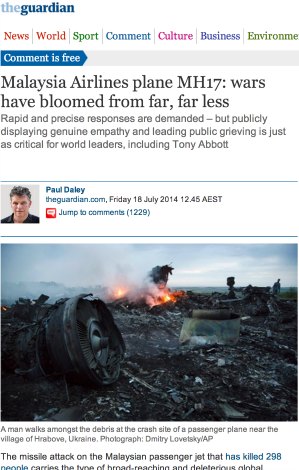
INTERNATIONAL
The horror of the crash that killed 298 people was not a day old before blame was being vigorously assigned by all sides. Not only is this deeply unhelpful and disrespectful, it obscures the fact that, whatever actually happened, a terrible tragedy is at risk of being compounded by the hot-heads on all sides calling for more war and escalation of a conflict in which both Russia and the United States have acted with rank opportunism.
READ MORE 
-
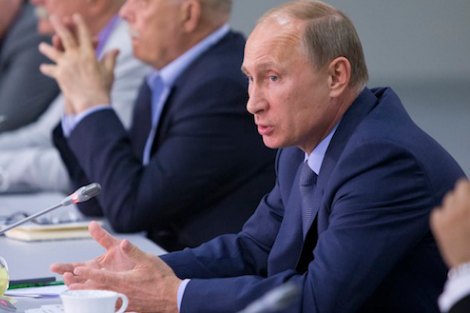
INTERNATIONAL
Initially I was uneasy about Abbott's strong anti-Putin rhetoric. Why was Australia so upfront, so early? I thought he was jumping to conclusions too soon. It is clear now though that his response was based on the same satellite imagery intelligence that John Kerry and Hilary Clinton cite as evidence that it was a Russian missile fired from Russian-supported insurgent territory. He was right, and Bill Shorten is correct to support him.
READ MORE 
-
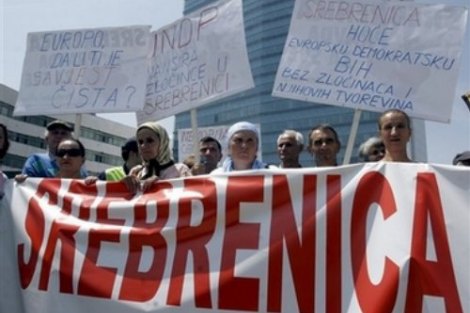
INTERNATIONAL
- Binoy Kampmark
- 21 July 2014
1 Comment
Last week the Dutch Supreme Court found that the Netherlands was liable for the deaths of over 300 Bosnian Muslim men and boys at Srebrenica in Bosnia-Hercegovina in July 1995. They had been part of a group of 5000 refugees, who had been sheltering with Dutch UN peacekeepers known as Dutchbat and were handed over to Serb forces in exchange for 14 Dutch peacekeepers. A historical arrangement had been writ in blood.
READ MORE 
-
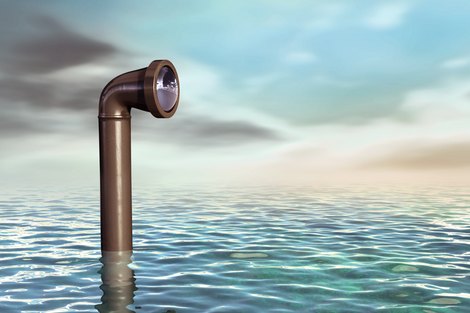
ARTS AND CULTURE
When I was young, I thought that men and women in the military were violent and foolish. Now I understand that they are braver than I was, brave enough to admit and acknowledge our ancient addiction, and in many cases do astounding things to bring it to an end; the most eloquent and articulate agents for peace I ever met are those who've been in wars, and the most strident agents for wanton butchery are those who never knew it.
READ MORE 
-

INTERNATIONAL
- Walter Hamilton
- 09 April 2014
3 Comments
The two powers in Asia on whom our economy and security depend, Japan and China, have reached an impasse. That should not constrain Australia from reaching out to both on the basis of mutual interest and shared values. China has a keen appreciation of the former and an abiding suspicion of appeals to the latter. Distinguishing one from the other and acting accordingly is the first great test of Abbott's statecraft.
READ MORE 
-
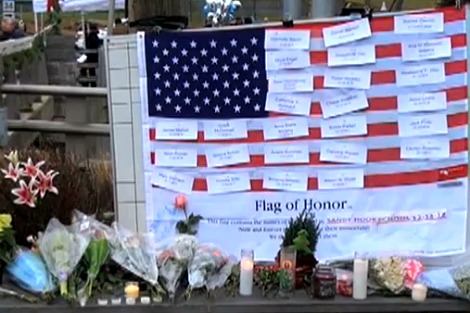
INTERNATIONAL
- Fatima Measham
- 13 December 2013
14 Comments
I woke up to the news on a Saturday morning. One year ago tomorrow, a man walked into the Sandy Hook Elementary School in Newtown, Connecticut, and opened fire. In the aftermath, gun lobbyists seethed with high indignation that President Barack Obama was politicising a tragedy. It goes to show that the ones who complain about the politicisation of tragedy tend to be the ones who do not want to do anything about it.
READ MORE
-

ECONOMICS
- Jean-Paul Gagnon
- 18 November 2013
15 Comments
What if citizens were given the chance to fill out a preference form online as part of their own personal, digital tax portal? You could choose to pick 'below the line' and individually choose what your tax money can and can't be spent on. For example you might like to spend on funding public schools, the bullet train, hospital supplies and museums, and not to spend on nuclear power plants, weapons development, or the automotive industry subsidy.
READ MORE 
-

AUSTRALIA
- Tony Kevin
- 08 November 2013
23 Comments
The Coalition's impending destruction of the Australian car industry by calculated public stalling of decisions on government assistance is shaping up as its most disastrous high-visibility policy blunder. This industry — but none other — is to be wilfully abandoned as a victim of rigid free-market economic ideologies. It does not make sense, in economic, social or national security terms. This is Australia's version of US Tea Party budget brinkmanship.
READ MORE 
-

ARTS AND CULTURE
Cigarette smoke curls in the air like the Buddha's eyelashes. Dishes collect in the sink like a shipwreck. Black ants trail like a gang from changhi. Sunshine like butter in honey ... A thought grows like ivy, scratches the skin.
READ MORE 
-
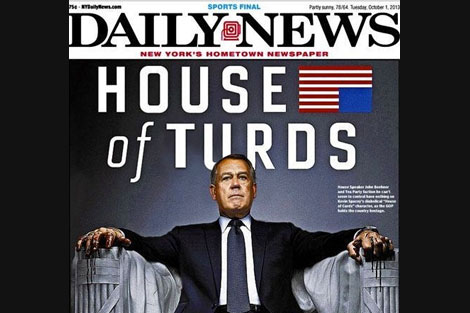
INTERNATIONAL
- Jim McDermott
- 04 October 2013
13 Comments
That's right — the House Republicans shut down the government because they oppose universal health care. Which for the rest of the world is like crazy talk gibberspeak. Opposing people's right to have health coverage is like opposing Disneyland — in fact it's even weirder, because you can at least imagine someone saying 'I just don't like giant smiling mice'. Who in their right mind would say 'I just don't want people to have health care'?
READ MORE 
-

EDUCATION
- Frank Brennan
- 30 September 2013
Full text from Frank Brennan's lecture 'Law teachers as gatekeepers of law, public morality and human rights: Equipping our students for moral argument in a pluralistic legal environment' at the Australian Law Teachers Association Annual Conference 2013.
READ MORE